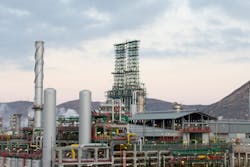Spain’s Repsol adding biofuels plant at Cartagena refinery
Repsol SA has let a contract to Axens Group of France to license technology for Spain’s first advanced biofuels production plant to be built at the operator’s 220,000-b/d Cartagena refinery in the country’s southeastern province of Murcia, along the Mediterranean Sea.
As part of the Nov. 10 contract, Axens will provide licensing for its proprietary Vegan technology—which hydrotreats a wide range of lipids for production of low-density, high-cetane renewable diesel as well as renewable, sulfur-free jet fuel—to be implemented in a new hydrotreating unit that will use a feedstock of recycled raw materials to produce 250,000 tonnes/year of hydrobiodiesel, biojet fuel, bionaphtha, and biopropane, Axens and Repsol said.
Alongside technology licensing, Axen’s scope of delivery under the contract also will include supply of catalysts, adsorbents, proprietary equipment, as well as process books and technical services.
First announced in late October, the €188 million Cartagena renewables investment—which also includes commissioning of a new hydrogen plant—comes as part of Repsol’s December 2019 commitment to advancing the energy transition and the company’s goal of achieving net-zero emissions by 2050 in accordance with the Paris Agreement.
Construction and commissioning of the decarbonization project—which will be carried out in different phases—will require participation of about 1,000 professionals from diverse fields, furthering Repsol’s additional commitment to develop Spain’s industrial sector and economy via financial investments and generation of stable, quality employment, the operator said on Oct. 22.
“With [the Cartagena advanced biofuels project], we at Repsol are decisively promoting a new technological route that will be key in our path towards carbon neutrality,” said Josu Jon Imaz, Repsol’s chief executive officer, noting that this latest initiative adds to the company’s portfolio of existing projects in energy efficiency, low-emissions electricity generation, renewable hydrogen, circular economy, synthetic fuels, as well as CO2 capture, use, and storage.
“Spain must base its decarbonization strategy on its industrial and technological capabilities, because that will be the way to promote a competitive and innovative business fabric,” said Imaz.
“[A]ll forms of decarbonization are valid and complementary, and incentivizing them so that they can all contribute, without exclusion, will accelerate the energy transition and help us, as a society, achieve a speedy economic recovery, so necessary under the current circumstances of the coronavirus [COVID-19] pandemic,” Imaz added.
Emphasizing the importance of the circular economy as a tool for efficient use of resources, Repsol said it plans by 2030 to double production of high-quality biofuels from vegetable oils (HVO) to 600,000 tpy, half of which will be produced from waste before 2025.
In addition to its June 15 announcement of two industrial decarbonization projects planned at its majority owned Petróleos del Norte SA’s (Petronor) 220,000-b/d Bilbao refinery in Múskiz, Vizcaya—including a new €60-million, 50-b/d zero-emissions synthetic fuel production plant based on CO2 and green hydrogen due for startup in 2024, as well as a grassroots €20-million pyrolysis plant that will use a feedstock of 10,000 tpy of urban waste to produce gas to partly replace traditional fuels currently used in the Bilbao refinery’s production processes—Petrobras confirmed its 150,000-b/d Puertollano refinery in Spain’s province of Ciudad Real, Castile-La Mancha, also produced its first batch of biojet fuel Spain’s aviation market in July.
By yearend 2020, Repsol said it also will reduce its carbon intensity index by 3% with respect to a 2016 baseline.
About the Author
Robert Brelsford
Downstream Editor
Robert Brelsford joined Oil & Gas Journal in October 2013 as downstream technology editor after 8 years as a crude oil price and news reporter on spot crude transactions at the US Gulf Coast, West Coast, Canadian, and Latin American markets. He holds a BA (2000) in English from Rice University and an MS (2003) in education and social policy from Northwestern University.

